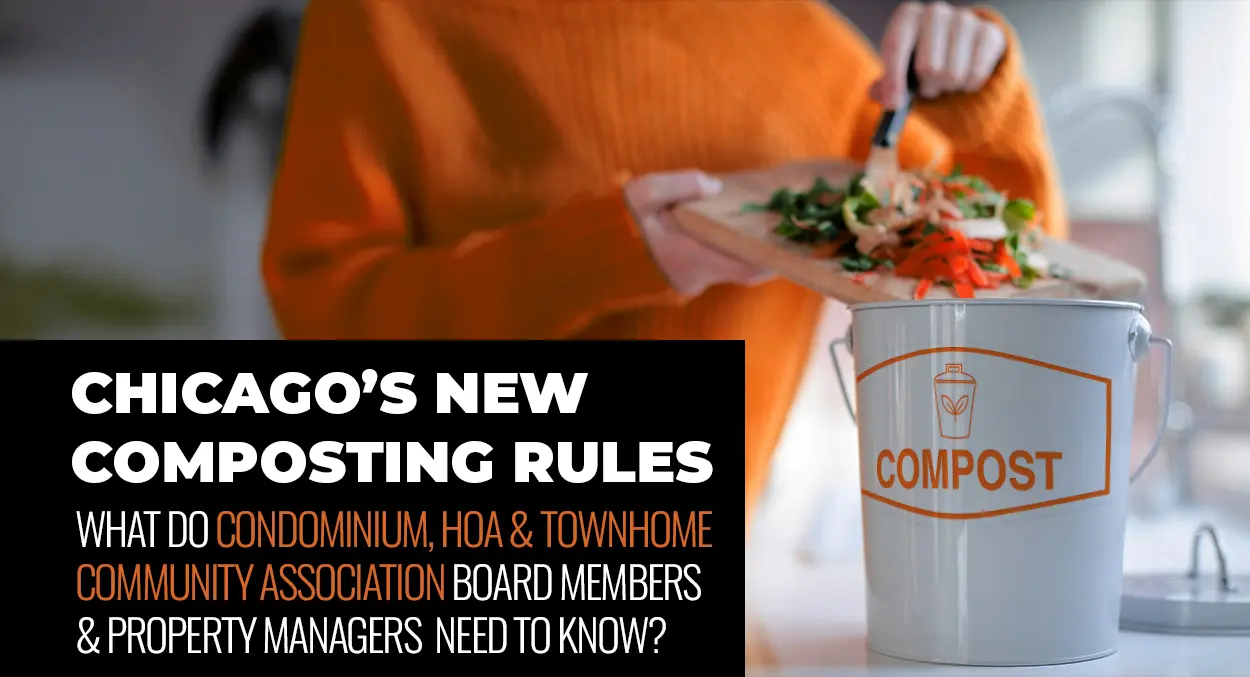- Community Associations, Legal Updates
- Illinois
On October 16, 2025, the City of Chicago adopted a new organic-waste and composting ordinance (SO2025-0018160) that modifies how composting and organic-waste collection are regulated within the city. The new rules carry important implications for condominium, homeowner (HOA), and townhome community associations in the City of Chicago, Illinois.
Key Legal Changes & What They Mean for Associations
Here’s a summary of the key provisions of the ordinance and how they apply in an association setting:
Ban on “unreasonable restrictions” – The ordinance provides that property managers or building owners may no longer enforce blanket prohibitions on tenants composting, dropping off organic waste at certified facilities, or contracting with licensed private haul-away providers provided the systems meet the ordinance’s requirements (ex. fully enclosed, pest-controlled, leak-resistant containers).
Requirements for containers and control of odor/pests/leaks – The ordinance mandates that compost/organic-waste containers must be fully enclosed, have openings no larger than ¼ inch (or equivalent seal), control odor/pests, be leak-resistant, and operate in a safe, sanitary manner.
Impact to Chicago Community Associations
Here are several practical recommendations for boards, property managers, and unit owners:
- An association cannot adopt or maintain a rule that simply says “no resident may compost or participate in an organic-waste collection program” if the resident’s plan complies with the container-and-collection requirements.
- Boards must review governing documents and rules/regulations for any overly broad prohibitions and revise them to allow compliance with the ordinance, subject to “reasonable restrictions” (ex. container size, location, odor, control, pest control).
- Particularly in condo or townhome settings where units share building systems or common-area waste systems, the association must balance unit-owner rights (to compost/organic-waste drop-off) with common-area responsibilities (waste containment, collection, maintenance).
- The association should consider creating or updating a policy spelling out acceptable containers, locations, maintenance standards, and inspection rights to avoid odor/pest issues that affect the common areas or other residents.
- In shared-building scenarios (ex. condos with shared garbage rooms or service corridors), the board should review whether the existing waste-receptacle setup permits safe composting or whether additional infrastructure (ex. odor-seal lids, pest-proof bins, dedicated drop-off area) is needed.
Fines, Legal Challenges, and Enforcement
The ordinance allows individuals to seek injunctive or declaratory relief if their rights under the ordinance are violated. The City of Chicago has enforcement authority with fines of roughly $300–$600 per offense. Non-compliant operations, especially those causing nuisances, may be fined and ordered to stop or remedy the condition.
Board members and management should be aware that, if community rules are overly restrictive or applied in a way that effectively prohibits composting in compliant containers, unit owners may challenge the association.
On contrast, the association itself may face liability or regulatory enforcement if composting and/or organic-waste containers are improperly placed, maintained or become a nuisance (ex. odor, pests, leaks) in the common areas or service areas.
It’s prudent for Chicago community associations to adopt an internal compliance plan that establishes inspections, outlines notice requirements, defines violation procedures for composting misuse, and details remediation steps for problem containers or misuse.
Legal Resource
The new Chicago composting/organic-waste ordinance presents both opportunities and responsibilities for condo, homeowner (HOA) and townhome community associations. It both encourages more sustainable waste practices while requiring associations to revisit governing documents and develop compliant, enforceable regulations.
Board members and property managers should act proactively and update rules, adopt policies, coordinate with vendors, inspect for compliance, and educate association members. Failure to do so may result in regulatory liability, nuisance issues, or unit owner disputes.
Questions about this new Chicago ordinance, reviewing/amending governing documents, developing composting policies, responding to questions from unit owners, or other legal concerns?
Please call 855-537-0500 or visit www.ksnlaw.com.
Since 1983, KSN has been a legal resource for condominium, homeowner, and townhome associations. Additionally, we represent clients in real estate transactions, collections, landlord/tenant issues, and property tax appeals. We represent thousands of clients and community associations throughout the US with offices in several states including Florida, Illinois, Indiana, and Wisconsin.
Please note the material contained in this article is for educational and informational purposes only and does not constitute legal advice. No attorney-client relationship is established by your review or receipt of the information contained in this article. You should not act on the information discussed in this article without first obtaining legal advice from an attorney duly licensed to practice law in your State. While KSN has made every effort to include up-to-date information in this article, the law can change quickly. Accordingly, please understand that information discussed in this article may not yet reflect the most recent legal developments. Material is not guaranteed to be correct, complete, or up to date. KSN reserves the right to revise or update the information and statements of law discussed in the article law at any time, without notice, and disclaims any liability for your use of information or statements of law discussed in the article, or the accessibility of the article generally. This article may be considered advertising in some jurisdictions under applicable law/s and/or ethical rules/regulations. © 2025 Kovitz Shifrin Nesbit, A Professional Corporation.


